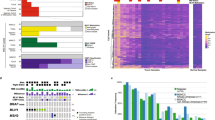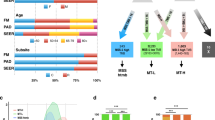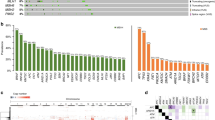Abstract
Activation of the phosphatidylinositol 3′-kinase (PI3K)/AKT pathway results in an increase in cell proliferation and survival. Somatic mutations within the PI3K catalytic subunit, PIK3CA are common cause of increasing PI3K activity and are believed to be oncogenic in many cancer types. Few reports addressed the association between PIK3CA mutations and tumor progression specifically in microsatellite instable (MSI) colorectal cancer (CRC). In the present study, we have evaluated PIK3CA mutational status in a series of 410 Middle Eastern CRC and 13 colon cell lines to study the prevalence of PIK3CA mutations in MSI cases, PTEN expression in CRC and possibility of therapeutic targeting of this set of patients. PIK3CA mutations were found in four of the cell lines tested and 51 colorectal carcinomas (12.2%). Three of these four mutated cell lines were MSI. PTEN was inactivated in 66.1% of the CRC. Furthermore, we observed a strong association between PIK3CA mutations and MSI status (P=0.0046) while PTEN loss was more frequent in microsatellite stable (MSS) CRC (P=0.043). A high prevalence of genetic alterations in PI3K/AKT pathway in Saudi cohort of CRC, predominance of PIK3CA mutations in the MSI subgroup and their possible involvement in development/progression of this subset of CRC are some of the significant findings of our study.
This is a preview of subscription content, access via your institution
Access options
Subscribe to this journal
Receive 50 print issues and online access
$259.00 per year
only $5.18 per issue
Buy this article
- Purchase on Springer Link
- Instant access to full article PDF
Prices may be subject to local taxes which are calculated during checkout


Similar content being viewed by others
References
Abbott RT, Tripp S, Perkins SL, Elenitoba-Johnson KS, Lim MS . (2003). Analysis of the PI-3-Kinase-PTEN-AKT pathway in human lymphoma and leukemia using a cell line microarray. Mod Pathol 16: 607–612.
Abubaker J, Bavi PP, Al-Harbi S, Siraj AK, Al-Dayel F, Uddin S et al. (2007). PIK3CA mutations are mutually exclusive with PTEN loss in diffuse large B-cell lymphoma. Leukemia 21: 2368–2370.
Bader AG, Kang S, Zhao L, Vogt PK . (2005). Oncogenic PI3K deregulates transcription and translation. Nat Rev Cancer 5: 921–929.
Bavi P, Jehan Z, Atizado V, Al-Dossari H, Al-Dayel F, Tulbah A et al. (2006). Prevalence of fragile histidine triad expression in tumors from Saudi Arabia: a tissue microarray analysis. Cancer Epidemiol Biomarkers Prev 15: 1708–1718.
Boland CR, Thibodeau SN, Hamilton SR, Sidransky D, Eshleman JR, Burt RW et al. (1998). A National Cancer Institute workshop on microsatellite instability for cancer detection and familial predisposition: development of international criteria for the determination of microsatellite instability in colorectal cancer. Cancer Res 58: 5248–5257.
Bose S, Chandran S, Mirocha JM, Bose N . (2006). The Akt pathway in human breast cancer: a tissue-array-based analysis. Mod Pathol 19: 238–245.
Bose S, Crane A, Hibshoosh H, Mansukhani M, Sandweis L, Parsons R . (2002). Reduced expression of PTEN correlates with breast cancer progression. Hum Pathol 33: 405–409.
Bray F, Sankila R, Ferlay J, Parkin DM . (2002). Estimates of cancer incidence and mortality in Europe in 1995. Eur J Cancer 38: 99–166.
Broderick DK, Di C, Parrett TJ, Samuels YR, Cummins JM, McLendon RE et al. (2004). Mutations of PIK3CA in anaplastic oligodendrogliomas, high-grade astrocytomas, and medulloblastomas. Cancer Res 64: 5048–5050.
Campbell IG, Russell SE, Choong DY, Montgomery KG, Ciavarella ML, Hooi CS et al. (2004). Mutation of the PIK3CA gene in ovarian and breast cancer. Cancer Res 64: 7678–7681.
Cully M, You H, Levine AJ, Mak TW . (2006). Beyond PTEN mutations: the PI3K pathway as an integrator of multiple inputs during tumorigenesis. Nat Rev Cancer 6: 184–192.
El-Hazmi MA, Al-Swailem AR, Warsy AS, Al-Swailem AM, Sulaimani R, Al-Meshari AA . (1995). Consanguinity among the Saudi Arabian population. J Med Genet 32: 623–626.
Frattini M, Signoroni S, Pilotti S, Bertario L, Benvenuti S, Zanon C et al. (2005). Phosphatase protein homologue to tensin expression and phosphatidylinositol-3 phosphate kinase mutations in colorectal cancer. Cancer Res 65: 11227.
Garcia Z, Kumar A, Marques M, Cortes I, Carrera AC . (2006). Phosphoinositide 3-kinase controls early and late events in mammalian cell division. EMBO J 25: 655–661.
Isbister WH, Murad M, Habib Z . (2000). Rectal cancer in the Kingdom of Saudi Arabia: the King Faisal Specialist Hospital experience. Aust NZ J Surg 70: 269–274.
Kononen J, Bubendorf L, Kallioniemi A, Barlund M, Schraml P, Leighton S et al. (1998). Tissue microarrays for high-throughput molecular profiling of tumor specimens. Nat Med 4: 844–847.
Lee JW, Soung YH, Kim SY, Lee HW, Park WS, Nam SW et al. (2005). PIK3CA gene is frequently mutated in breast carcinomas and hepatocellular carcinomas. Oncogene 24: 1477–1480.
Levine DA, Bogomolniy F, Yee CJ, Lash A, Barakat RR, Borgen PI et al. (2005). Frequent mutation of the PIK3CA gene in ovarian and breast cancers. Clin Cancer Res 11: 2875–2878.
Li VS, Wong CW, Chan TL, Chan AS, Zhao W, Chu KM et al. (2005). Mutations of PIK3CA in gastric adenocarcinoma. BMC Cancer 5: 29.
Maruyama N, Miyoshi Y, Taguchi T, Tamaki Y, Monden M, Noguchi S . (2007). Clinicopathologic analysis of breast cancers with PIK3CA mutations in Japanese women. Clin Cancer Res 13: 408–414.
Nassif NT, Lobo GP, Wu X, Henderson CJ, Morrison CD, Eng C et al. (2004). PTEN mutations are common in sporadic microsatellite stable colorectal cancer. Oncogene 23: 617–628.
Ollikainen M, Gylling A, Puputti M, Nupponen NN, Abdel-Rahman WM, Butzow R et al. (2007). Patterns of PIK3CA alterations in familial colorectal and endometrial carcinoma. Int J Cancer 121: 915–920.
Philp AJ, Phillips WA, Rockman SP, Vincan E, Baindur-Hudson S, Burns W et al. (2000). Microsatellite instability in gastrointestinal tract tumours. Int J Surg Investig 2: 267–274.
Saal LH, Holm K, Maurer M, Memeo L, Su T, Wang X et al. (2005). PIK3CA mutations correlate with hormone receptors, node metastasis, and ERBB2, and are mutually exclusive with PTEN loss in human breast carcinoma. Cancer Res 65: 2554–2559.
Samuels Y, Diaz Jr LA, Schmidt-Kittler O, Cummins JM, Delong L, Cheong I et al. (2005). Mutant PIK3CA promotes cell growth and invasion of human cancer cells. Cancer Cell 7: 561–573.
Samuels Y, Wang Z, Bardelli A, Silliman N, Ptak J, Szabo S et al. (2004). High frequency of mutations of the PIK3CA gene in human cancers. Science 304: 554.
Singh B, Reddy PG, Goberdhan A, Walsh C, Dao S, Ngai I et al. (2002). p53 regulates cell survival by inhibiting PIK3CA in squamous cell carcinomas. Genes Dev 16: 984–993.
Toyota M, Itoh F, Imai K . (2000). DNA methylation and gastrointestinal malignancies: functional consequences and clinical implications. J Gastroenterol 35: 727–734.
Uddin S, Hussain AR, Siraj AK, Manogaran PS, Al-Jomah NA, Moorji A et al. (2006). Role of phosphatidylinositol 3′-kinase/AKT pathway in diffuse large B-cell lymphoma survival. Blood 108: 4178–4186.
Velho S, Oliveira C, Ferreira A, Ferreira AC, Suriano G, Schwartz Jr S et al. (2005). The prevalence of PIK3CA mutations in gastric and colon cancer. Eur J Cancer 41: 1649–1654.
Vivanco I, Sawyers CL . (2002). The phosphatidylinositol 3-Kinase AKT pathway in human cancer. Nat Rev Cancer 2: 489–501.
Wymann MP, Marone R . (2005). Phosphoinositide 3-kinase in disease: timing, location, and scaffolding. Curr Opin Cell Biol 17: 141–149.
Author information
Authors and Affiliations
Corresponding author
Rights and permissions
About this article
Cite this article
Abubaker, J., Bavi, P., Al-Harbi, S. et al. Clinicopathological analysis of colorectal cancers with PIK3CA mutations in Middle Eastern population. Oncogene 27, 3539–3545 (2008). https://doi.org/10.1038/sj.onc.1211013
Received:
Revised:
Accepted:
Published:
Issue Date:
DOI: https://doi.org/10.1038/sj.onc.1211013
Keywords
This article is cited by
-
Colorectal cancer in Saudi Arabia as the proof-of-principle model for implementing strategies of predictive, preventive, and personalized medicine in healthcare
EPMA Journal (2020)
-
Prognostic impact of mutation profiling in patients with stage II and III colon cancer
Scientific Reports (2016)
-
Discovery of colorectal cancer PIK3CA mutation as potential predictive biomarker: power and promise of molecular pathological epidemiology
Oncogene (2014)
-
Molecular Predictors and Prognostic Markers in the Adjuvant Therapy for Colon Cancer
Current Colorectal Cancer Reports (2014)
-
Potential Role of KRAS and Other Mutations in the Adjuvant Therapy of Colorectal Cancer
Current Colorectal Cancer Reports (2012)



